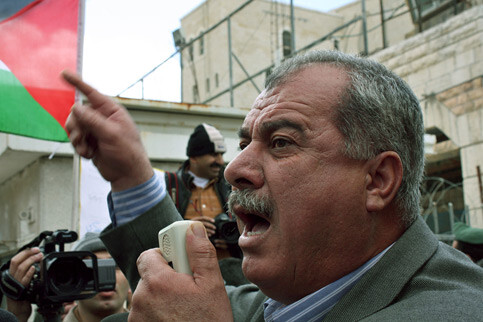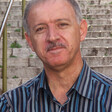The Electronic Intifada 6 May 2010

Israel is increasingly oppressing Palestinian leaders in Israel, like Member of Knesset Mohammed Barakeh, pictured here at a Land Day demonstration in Hebron, March 2009. (Mamoun Wazwaz/MaanImages)
Ameer Makhoul, director of Ittijah and chairman of the Popular Committee for the Defense of the Political Freedoms, was arrested by Israeli forces today during a raid of his home, two weeks after a travel ban was imposed on him by the Israeli Ministry of the Interior. Police have also raided the offices of Ittijah and confiscated equipment and documents. Makhoul, a Palestinian with Israeli citizenship, submitted the following op-ed to The Electronic Intifada prior to his arrest:
Last month, when I traveled from Haifa to the land border between Jordan and Israel, the Israeli border police prevented me from leaving my country. The police handed me an order issued by the Israeli Minister of the Interior Eli Yishai prohibiting me to leave Israel for two months. The travel ban imposed on me is part of an increased campaign to intimidate and to spread fear among Palestinian civil society. The repression is meant to divide us, but it has had the opposite effect. We Palestinians in Israel, the West Bank, Gaza and the diaspora are only more determined and united to claim our rights and to build a nation where we can live in freedom and have equal rights.
The Israeli minister of the interior holds the opinion that my travel outside the country “poses a serious threat to the security of the state,” according to article 6 of the 1948 emergency regulations. I am the director of Ittijah, Union of Arab Community-Based Associations and the chairman of the Popular Committee for the Defense of Political Freedoms, which is a sub-committee of the High Monitoring Committee of Arabs in Israel. All three bodies unite Palestinian Arabs in Israel and we jointly decided not to appeal my travel ban at the Israeli high court.
Any meeting in the Arab world or with any Arab person anywhere in the world arouses the suspicion of the authorities. The accusations against me are made on the basis of secret evidence that I am not allowed to see, and the high court merely acts as an extension of the Israeli General Security Services (GSS), or the Shin Bet. Israel does not need to prove that there is reason for suspicion; instead, I have to prove that there is no need for their suspicion. The Israeli legal system is far from fair for Palestinians.
Israel is intimidating Ittijah and the Popular Committee for the Defense of Political Freedoms because we are reasserting our community’s stake in the Palestinian struggle. Twenty years ago few considered the Palestinians in Israel as a part of the Palestinian people or the Palestinian cause. During the Oslo process of the 1990s, we were considered an internal problem for Israel to deal with, but our networking, advocacy and lobbying has changed this. Israel is increasingly repressing us to divide Palestinians from each other and isolate us from the outside world.
The repression and persecution of Palestinians in Israel is not new. Since 1948 Israel imposed a policy of control under the guise of security. In 2007, Shin Bet chief Yuval Diskin introduced a new policy targeting the whole Palestinian community as a security risk to thwart democratic efforts such as the issuing by Palestinian civil society in Israel visions of a state for all its citizens.
Repression has increased dramatically since then and more than 1,000 Palestinian youths in Israel were interrogated by the Shin Bet after the Gaza massacre of winter 2008-09. Leaders of the Palestinian civil society, like myself, are under attack. Sheikh Raed Salah, the leader of the Islamic movement, is being persecuted for his involvement in the protection of Jerusalem from ongoing Israeli colonization and extremist settlers. Palestinian member of the Israeli parliament (Knesset) Mohammed Barakeh was shot in the leg with a sound bomb when he tried to protect protesters from the aggression of Israeli forces in the West Bank village of Bilin. MK Said Nafa was stripped of parliamentary immunity because of his visit to Syria, while former MK Azmi Bishara found himself in an imposed exile since three years for the same reason. One year ago, the Shin Bet ordered me to come to their offices and they interrogated me for one day in an attempt to silence my protest of the Israeli massacre in Gaza.
Israel applies a multi-track approach to attack our struggle: the authorities repress and persecute Palestinians while they prohibit foreign solidarity activists, organizations and journalists from visiting the occupied West Bank and Gaza Strip. Additionally, right-wing groups within Israel commit public violence against Palestinian families in places like Acre and Jaffa, with total impunity. One week ago the right-wing group Im Tirtzu published posters inciting violence against individual members of Adalah - The Legal Center for Arab Minority Rights.
Palestinian civil society protests Israel’s repressive policies of intimidation but at the same time resolves to continue our struggle. We have achieved unity, and it is important for us to protect this. We will not allow Israel to isolate members or parts of our community. We have become more influential in the Arab media and we will use this influence. We have built our international networks and we call on them to support us. The attacks that are meant to divide us have had the complete opposite effect. Injustice unites us; we are all together in this struggle.




